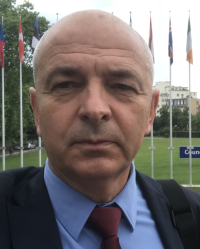In addition to empowering young political and civil society leaders, the School helps them network and cooperate, which is perhaps the biggest contribution to reconciliation within Bosnia and Herzegovina.

Esad Mavrić
When you live in Bosnia and Herzegovina, trying to be a citizen without prejudice, it is important to believe in ideas that will lead the country onto a better path and a more certain future.
And politicians are to blame for the fact that citizens of this country aren’t well.
How do we create a better environment, how do we eradicate rigidity on the political scene?
An answer is certainly putting faith in the youth, in future politicians, who will think differently to the current leaders – ones that have been unsuccessfully leading this country for 30 years.
Having enviable experience working in the Council of Europe, I decided to dedicate my time and self to goals of prosperity, and that is how the idea to launch a School for Political Studies in Bosnia and Herzegovina was born.
Let me preface by saying that we are only one of the institutions of this kind. There are some other political schools, especially in the non-governmental sector, which are dedicated to this: creating a framework and program for young leaders from political and public life who will enter the political arena of this country with a modern approach, and be the guarantors of a better future.
We operate within the network of schools for political studies of the Council of Europe, which further strengthens the belief that a different and better environment will emerge – we were founded to provide additional informal education to future leaders.
Through our annual cycles of seminars and conferences, we create an environment where new young political leaders, who will be dedicated to fostering democracy, the rule of law and human rights, can take on an active role and be generators of dialogue and democratic political culture, of growth of a modern state and instigators of political, economic, social, media and cultural spheres of life.
Participants are chosen from different political parties and institutions.
Our school is part of a family of 20 other schools from countries of Eastern and Southeastern Europe, the Caucasus and Africa.
We offer quality education in the areas mentioned, we encourage a culture of political dialogue as a positive model of communication, emphasizing effective cooperation, as well as general needs and interests of society.
In the twenty years after the war, politics in Bosnia and Herzegovina was mostly defined by narrow ethnic interests, intra-party democracies, with concentration of power in the hands of one leader. The result was a negative influence on the political dialogue, which continues to preserve the political status quo, preventing the promotion of alternative ideas, especially of young people and women.
For these reasons our School strives to increase capacities of young leaders as decision-makers, encouraging them to take a more active role in political processes in Bosnia and Herzegovina. They acquire skills on how to strengthen their own position and role within their party, how to facilitate future dialogue and cooperation between parties, how to increase understanding of common problems regardless of political affiliation, entity, ethnic group or part of BiH where they come from. This is how we try to nurture a sustainable network of educated young leaders, who can overcome the divisions that define the current political system in Bosnia and Herzegovina.
The program started in 2009 within the Council of Europe office in Sarajevo, the and up until 2022 about 450 young leaders have attended the School. A strong network of Alumni was created, and over time a good number of them reached levels in which they can create democratic processes in the country, holding very serious positions at all levels of government in Bosnia and Herzegovina.
An important result of the program is that it contributed to the strengthening of youth structures within political parties, motivating political parties to create “political academies” where our alumni continue to act as initiators and founders.
In addition to empowering young political and civil society leaders, the School helps them network and cooperate, which is perhaps the biggest contribution to reconciliation within Bosnia and Herzegovina.
Esad Mavrić is director of the School of Political Studies, former journalist, and executive secretary and project manager of the Council of Europe Office in Sarajevo



Leave A Comment